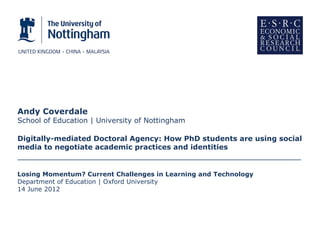Digitally-mediated Doctoral Agency
- 1. Andy Coverdale School of Education | University of Nottingham Digitally-mediated Doctoral Agency: How PhD students are using social media to negotiate academic practices and identities ________________________________________________________ Losing Momentum? Current Challenges in Learning and Technology Department of Education | Oxford University 14 June 2012
- 2. Doctoral Agency ________________________________________________________ Human Agency ŌĆ£The power of people to act purposively and reflectively, in more or less complex interrelationships with one another, to reiterate and remake the world in which they live.ŌĆØ (Inden, 1990: 23) Human agency ŌĆ£happens daily and mundanelyŌĆØ (Holland et al, 1998) A ŌĆścultural viewŌĆÖ of learning (Bruner, 1996) ŌĆó Construction of a conceptual system that ŌĆśorganisesŌĆÖ a record of agentic encounters ŌĆó Performed through knowledge and skills acquisition in specific settings ŌĆó Interrelated with identity development Doctoral Contexts ŌĆó Socialisation and enculturation into specific fields of academic enquiry ŌĆó Transformation of identity ŌĆó Positionality ŌĆō locating oneself in the ŌĆśfieldŌĆÖ ŌĆó Doctoral research cultures ŌĆō (inter)disciplinary, supervisory, departmental, peer group
- 3. Key Motivations for Research ________________________________________________________ What is ŌĆśdoing a PhDŌĆÖ? ŌĆó Holistic and authentic models of doctoral practice ŌĆó Key phases in doctoral study across multiple practice contexts Ecological perspective of social media ŌĆó Contextualised and situated approach ŌĆó The multiplicity, interrelatedness and transiency of social media practice ŌĆó PLE as an idealised and consensual conceptual model Profiling and sampling participants ŌĆó The reality of low adoption rates and lack of widespread use ŌĆó Inclusive approach to social media users and user contexts
- 4. Research Design ________________________________________________________ Participants Six PhD students: ŌĆó Different stages of PhD ŌĆó Humanities, Social Sciences and Interdisciplinary ŌĆó Based in ŌĆśtraditionalŌĆÖ Faculty and Doctoral Training Centres (DTCs) Data Collection 15-month data collection period: ŌĆó Logging all digital artefacts (blog posts, tweets etc.) ŌĆó Field notes ŌĆó Participant-reported accounts ŌĆó Three interviews with each participant (90-120 mins. per interview)
- 5. Analytical Framework ________________________________________________________ Activity Theory ŌĆó Social, cultural and historical perspective of doctoral practices ŌĆó Culturally-mediated, object-oriented activity systems ŌĆó Objects are emergent and partly shared, fragmented and contested Data Analysis ŌĆó Used as a descriptive analytical framework ŌĆó Multiple and interrelated activity systems ŌĆó Open coding and ŌĆśthick descriptionŌĆÖ Agency in Activity Systems ŌĆó Object-oriented ŌĆśinteragencyŌĆÖ ŌĆó Development of cultural artefacts ŌĆó Figured worlds and genre knowledge
- 7. Cultural Artefact Development ________________________________________________________ Genre Studies ŌĆó Socio-cultural fork of Genre Studies (e.g. Berkenkotter & Huckin, 1993) ŌĆó Traditions of using tools rather than artefact categorisation ŌĆó Development of ŌĆśgenre knowledgeŌĆÖ as cultural tools Figured Worlds (Holland et al., 1998) ŌĆó Historical, socially enacted and culturally constructed in recognised frames of social life ŌĆó Space of authoringŌĆÖ (Bakhtin) ŌĆō mutual shaping of figured worlds
- 8. Key Findings ________________________________________________________ Developing Cultural Artefacts as Agentic Tools ŌĆó Purposes , contexts and stages of the PhD Agentic Contexts ŌĆó Agency exists within and across multiple and interrelated practice contexts ŌĆó Boundary crossing and interdisciplinary activities ŌĆó Peripheral and thesis-oriented work Loci of Agency ŌĆó Networked individualism vs. community development ŌĆó Relational agency (Edwards, 2008); Collective competency (Hakkarainen et al. 2004)
- 9. Key Findings ________________________________________________________ ŌĆ£Privileged InsightŌĆØ ŌĆó Social media practices within and across figured worlds increase authenticity of agency Partiality of Participatory Contexts ŌĆó Social media practices within and across figured worlds increase authenticity of agency ŌĆó Agency may be partially realised in figured worlds with limited social media adoption ŌĆó Greater reliability when integrated with other doctoral practices ŌĆó Dominant parties, discourses and cultural practices Ambiguity of Participatory Contexts ŌĆó Interactive vs. broadcast metaphors of social media engagement ŌĆó Identifiable and ŌĆśimaginedŌĆÖ audiences
- 10. Thanks Andy Coverdale Blog: http://www.phdblog.net Twitter: @andycoverdale Supervisors: Gordon Joyes & Charles Crook










